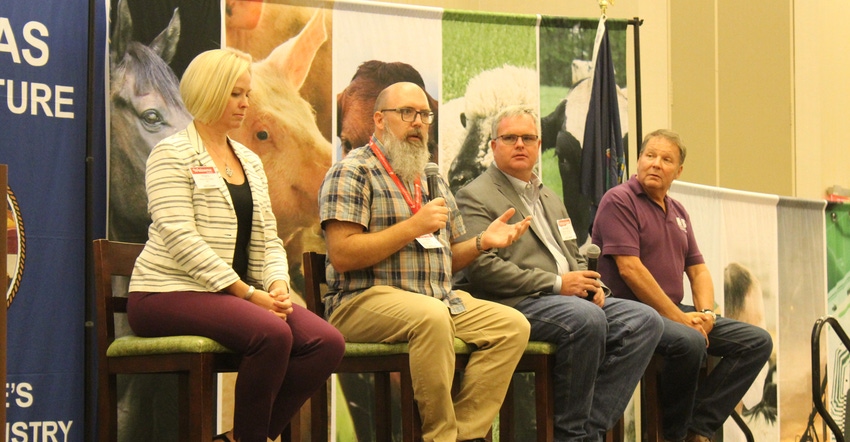
Hiring and retaining employees is a critical part of the food and agricultural sectors. And today, it’s more challenging than ever, say ag employers.
A panel of food and agricultural employers discussed how they approach their labor needs at the 2022 Kansas Governor’s Summit on Agricultural Growth, held Aug. 18 in Manhattan, Kan. The panel included Hilary Worcester, with Mid Kansas Cooperative, Manhattan; Andrew Gough, owner of Reverie Roasters & Founders Bakery, Newton and Wichita; Michael Springer, managing partner of Springer Family Foods, Neodesha; and Lon Frahm, owner of Frahm Farmland, Colby.
Skills needed
The days of hiring someone off the street to do manual labor on the farm are almost behind us, the panel agreed. Today’s equipment and technological advances mean employees need to not only be able to do physical labor, but also handle advanced computer systems.
“For us, skill is a big piece,” Worcester said. “We need people who not only can come help load out a truck, but also walk inside and utilize an advanced computer system.” That system tracks inventory across Mid Kansas Cooperative’s 40 locations in the state and is a critical part of daily business.
Worcester said MKC recruits employees through the arc of their lives, from someone with a GED to someone with a vocational technical degree or even a four-year college degree. The key, she said, is emphasizing training and mentoring.
Frahm agreed, and said he likes to focus on hiring workers earlier in their careers, and then train them and empower them.
“If you select the right people, train them, empower them and give them the right tools and opportunities, they stay,” Frahm said. “Nine of my 11 full-time guys have skin in the game. In other words, they are farmers, they own their own farm ground that they did not when they came to work for me.” Frahm helped them navigate the government programs that could help beginning farmers, and mentored them.
In return, Frahm says he now has nine employees who come to work on his farm and treat his acres with experience that they’ve developed on their own farms.
Worcester reminded farmers that they need to start looking beyond “farm kids” for agricultural jobs, too. “There are not enough good ol’ farm kids to fill these jobs,” she said. “We can’t be an industry where you have to have an innate understanding of it to be successful in it.”
Wages
Gough said when he was starting the specialty coffee business, he made it a point to build it based on paying employees a livable wage.
“We have instituted minimum standards of pay in various formats,” he said. Many may think that $15 an hour has been highly politicized, but for Gough, he found it took away employee anxiety and made them more productive.
“Just knowing they can afford to live on their job, then they tend to be much better employees,” he said. “And I believe that truly is what draws more people to us.”
Many food and agricultural employers focus on the wages they pay, but may forget other incentives that can attract and retain employees. Things like potential employee referral bonuses, housing, insurance and retirement plans are helpful as well.
Immigration
Springer said filling employment openings on his pig and crop farm in Montgomery and Wilson counties has been a challenge for some time. Until a few years ago, he was competing with nearby manufacturing plants for employees. Those folks have skills for farm work, but may not have the management and supervisory skills needed. And that’s why he’s turned to using Mexican and other Latin American workers to fill positions.
“In the last two years, my team has turned to one-third Latinos,” Springer said. They have the skills the farm needs, he added.
Springer uses the TN nonimmigrant visa classification that was created through NAFTA. It permits qualified Canadian and Mexican citizens to seek temporary entry into the U.S. to engage in business activities at a professional level. Generally, he says, it requires some technical education or a four-year college degree, and agriculture is one of the specialized areas where they can find temporary employment. These are full-year visas, issued for one to three years, and they can be extended indefinitely.
The challenge, though? It takes time to find an employee, navigate the program and get into the country, he said.
Future needs
Continuing automation in the food and agricultural sector means employers may be running with fewer employees, but those employees will need diverse skills.
Worcester, for example, says MKC is already running larger elevators with fewer people using automation, thus making it safer and much more efficient. From loading trains, to flying drones for chemical application, future employees will not only need skills to work with their hands — but also navigate technology.
Frahm said the future ag employee will be more than a “hired hand”; he or she will be a “professional.”
“I preach all the time when I go to work that we are professionals, and so we need to behave in a professional way,” he said.
Also, the panelists agreed that if food and agricultural businesses are to expand, there needs to be community skin in the game. For some, that means developing adequate housing for employees of nearby farming businesses. For others, that’s investing in better broadband access for technology advancements on the farm, and in training for young people to have careers in agriculture.
About the Author(s)
You May Also Like






